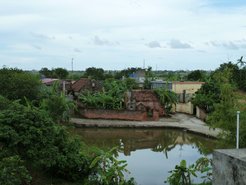Care and migration in Northern Vietnam: migrant family strategies, gender relations, and intergenerational exchanges

The ever increasing rural-urban labour migration in post-socialist Vietnam in the context of liberalised social services begs the question of how rural households with migrants address the care of children and the elderly. This project studies how such households in the Red River Delta organise, strategise, and negotiate care duties and care relations on a daily basis and over time and what these matter for social relationships within and beyond the household. Of particular importance are exchanges between genders and generations and the relationship between the household and the state.
Conceptually, the project draws from feminist theorisation of care, particularly in relation to migration, and anthropological concepts of social support and social security. Care thus involves the organisation of labour and resources and multiple social relationships and institutions that household members could access and have to negotiate in daily practices. These are simultaneously shaped by power relations and relations of mutual support.
Three major focuses of the research are:
- Local ideologies and morality of care, including local constructions of care needs;
- Actual organisation and negotiation of care between genders and generations within rural households with migrants; and
- The interrelationship between different institutions of care provision, including the household, kinship, neighbourhood, charity and the state
These will be explored through the daily practices and longer-term strategies of labour migrants and their rural households in the organisation of care. The fieldwork for this project will last for one year from August 2011 to July 2012 and its field sites will include migrant quarters in Hanoi and one rural village in the Red River Delta.
The project employs a mixed approach with greater emphasis on qualitative methods. A household survey will be conducted in the rural village where the migrants come from to understand general trends of care and migration in the local area. A range of qualitative methods are to be employed, including participant observation, in-depth interview, the Biographic Narrative Interpretive Method (BNIM), and focus groups.
